Earlier this month, Canadian music icon Neil Young released his latest album, The Monsanto Years. With tracks ranging in focus from corporate corruption, to the decline of democracy, to environmental degradation, this album has attracted significant controversy — British MP Owen Peterson and Monsanto itself objected to Young’s stance on GMOs.
But perhaps the most striking track off The Monsanto Years is: “People Want to Hear About Love.” The song is an indictment of public apathy towards social issues in lieu of just another love song that will “make them feel all right.”
Most importantly for students, this song resembles a prevalent criticism of youth today, of their disengagement from politics, in contrast with the mass mobilization of youth seen in the anti-war and civil rights protests of the early twentieth century.
There was an abundance of revolutionary anthems during youth social movements of the twentieth century — Bob Dylan and Woody Guthrie’s stirring folk, the Beatles’ “All You Need Is Love,” Billie Holiday’s haunting “Strange Fruit,” Young’s own “Ohio.”
Popular music today doesn’t demonstrate a similar social consciousness. A glance at the top 40 charts will show you songs more along the line of “Sugar,” “Uptown Funk,” and “Cheerleader.”
Is it catchy? Undeniably. It is also undeniably vapid and largely devoid of any valuable message.
Yet, this is not a sign that today’s youth are necessarily more apathetic. Nor is it the case that musicians care less about social issues. Rather, I would suggest that many of the challenges facing youth of today are more difficult to address and not so easy to unite around as the messages of peace, love, and equality that pervaded Woodstock.
For example, pursuing environmental sustainability is essential to the livelihood of youth and future generations. However, I would be hard pressed to identify even one recent song that has gained mass popularity and prominently addressed these issues. Likewise, there seems to be no popular soundtrack to protests against corporate corruption, rising education costs, and the private sector’s influence on democracy.
A possible exception to this trend is the movement for LGBTQ rights, which in fact has seeped into a vast array of mainstream music. Whether it be Lady Gaga’s “Born This Way,” Macklemore and Mary Lambert’s “Same Love,” these songs are united by a shared message of acceptance and appeal for all to recognize and embrace sexual diversity.
Perhaps it is due in part to the rich body of music from the civil rights era that racial discrimination and inequality continue to be addressed in current music. Take Kendrick Lamar’s critically acclaimed recent album To Pimp a Butterfly, for example, which compellingly examines racial issues in America. Likewise, Rihanna’s latest album provides clear examples of social consciousness, with her two latest singles “American Oxygen” and “Bitch better have my money” addressing racial issues in modern America.
Clearly there is still music out there that matters. In the case of racial discrimination and LGBTQ rights, that it has entered the public consciousness is a great thing. But music addressing other important aforementioned social issues remains under-exposed and under-appreciated.
When so much music seems to discourage, meaningful thought, compassion, or expansion of perspective, perhaps the most powerful stand we can take is not to turn away when a song makes us sad or uncomfortable.
I love catchy music and good love songs. That said, great music, like great film or literature, should engage us, inform us, and inspire us. Let us seek such music out.
Sasha Boutilier is a third–year student at St. Michael’s College studying political science and Ethics, Society & Law.


